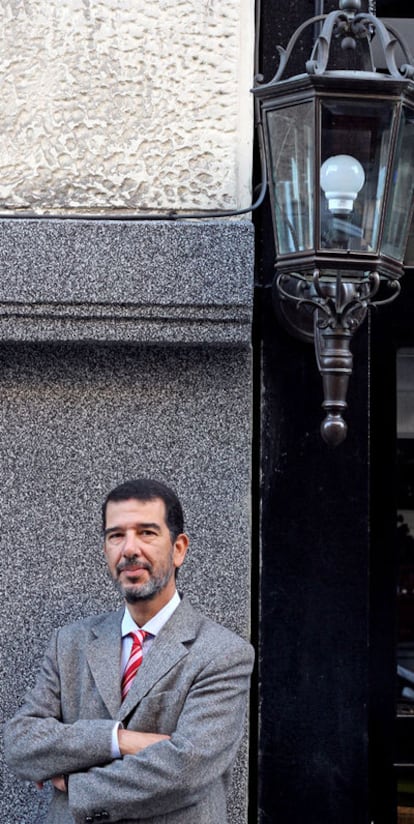"The court stands to become the laughing stock of the judiciary"
Amnesty International lawyer berates Supreme Court for Garzón Franco trial
Hugo Relva's thirst for justice equals his thirst for mate. The Argentinean-born lawyer, who has been legal adviser at Amnesty International for the past eight years, travels around the world with a supply of the herbal tea, which is a popular staple in his native country. If he forgets his mate, Relva usually seeks out a fellow Argentinean who can supply him with some.
The fight against impunity has taken him to different parts of the world, such as Kosovo and Sierra Leone. He is currently in Madrid to attend the trial of Judge Baltasar Garzón, which opened on Tuesday at the Supreme Court.
He is in the capital as an international observer, along with a half dozen other representatives from different NGOs.
Garzón is facing complaints that he overstepped his powers by opening an investigation four years ago into crimes committed during the 1936-39 Spanish Civil War and ensuing Franco dictatorship. If Relva was given the opportunity to testify before the seven justices on the bench, he has no doubts about what he would say.
"An investigation into human rights abuses by a judge can never, ever be considered criminal conduct," he says, adding that the 1977 amnesty law doesn't prevent investigations into crimes committed during either the civil war or the Franco dictatorship.
"This goes against Spain's international law obligations, including its duty to open inquiries into human rights abuses." As he sips his coffee - on this occasion there was no mate - Relva speaks in hushed, but deadly serious, tones.
He says that the judiciary in Latin America cannot understand what Spain is trying to do with its Franco past, after having taken a lead role in implementing the universal justice doctrine in many of the region's countries. Garzón became famous throughout the world for issuing an arrest warrant in 1998 against former Chilean dictator Augusto Pinochet.
Later he applied universal justice to seek the arrest in Mexico of former Argentinean military officer Miguel Cavallo, who was charged with torturing Spanish citizens during the 1976-83 Dirty War period. Cavallo, who was brought to Spain, was later handed over to Argentinean authorities. He also opened inquiries into the massacre of Indian peasants in Guatemala.
"The [Latin American] judges say that if they did this themselves [put him on trial] it would be a dishonor to humanity. If the Supreme Court finds Garzón guilty it will become the laughing stock of the entire judiciary."
Relva recalls two events that stand out in his mind during the 25 years he has spent working at Amnesty International. The first occurred during a trip to Sierra Leone, when he was shown pictures of hundreds of children with amputated hands. He remembers how terrified he was when he saw the images.
But his expression changes when he brings up the other event - the 2009 conviction of former Peruvian President Alberto Fujimori on genocide charges. Fujimori is serving a 25-year sentence for his crimes. Relva was there, accompanying the families of some of the victims, when the verdict and sentence was handed down.
"All of them had lost a son or a daughter but I didn't see any anger or desire for revenge - they just wanted justice," he said.
The Fujimori case gave Relva a sense of satisfaction at the time. But later there would be more cases and more battles.
"From time to time, you find drops of justice to quench your thirst," he says.

Tu suscripción se está usando en otro dispositivo
¿Quieres añadir otro usuario a tu suscripción?
Si continúas leyendo en este dispositivo, no se podrá leer en el otro.
FlechaTu suscripción se está usando en otro dispositivo y solo puedes acceder a EL PAÍS desde un dispositivo a la vez.
Si quieres compartir tu cuenta, cambia tu suscripción a la modalidad Premium, así podrás añadir otro usuario. Cada uno accederá con su propia cuenta de email, lo que os permitirá personalizar vuestra experiencia en EL PAÍS.
¿Tienes una suscripción de empresa? Accede aquí para contratar más cuentas.
En el caso de no saber quién está usando tu cuenta, te recomendamos cambiar tu contraseña aquí.
Si decides continuar compartiendo tu cuenta, este mensaje se mostrará en tu dispositivo y en el de la otra persona que está usando tu cuenta de forma indefinida, afectando a tu experiencia de lectura. Puedes consultar aquí los términos y condiciones de la suscripción digital.








































